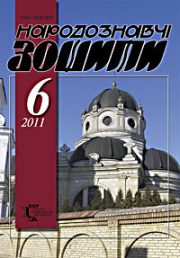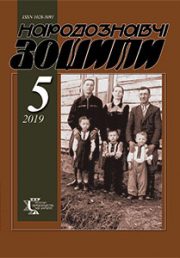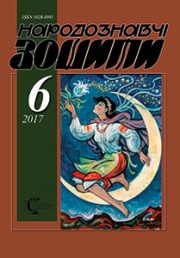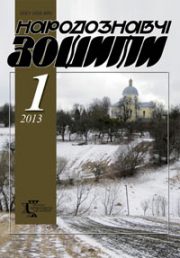The Ethnology Notebooks. 2025. № 3 (183), 681—688
UDK 81’373.612.2 Самчук
DOI https://doi.org/10.15407/nz2025.03.681
KUNCH Zoriana
- ORCID ID: https://orcid.org/0000-0002-8924-7274
- Scopus Author ID 57200316529
- PhD in Philology, Associate Professor,
- Director of the Institute of the Humanities and Social Sciences
- Lviv Polytechnic National University,
- 12, Stepana Bandery Str., 79013, Lviv, Ukraine,
- Contacts: e-mail: zoriana.y.kunch@lpnu.ua
Abstract. Problem Statement. A relevant issue in contemporary linguistics is the study of determinologization — namely, the process by which a term loses its definitive and systemic features and transitions from specialized terminology into general language use. One indicator of this process is a change in the term’s lexical collocability, accompanied by lexico-semantic transformations and the infusion of terminological lexemes with expressive meaning.
Purpose. This article aims to analyze frequently used determinologized lexemes in Ulas Samchuk’s literary texts from the perspective of their lexical collocability.
Materials. The factual material was drawn from the General Regionally Annotated Corpus of the Ukrainian language (GRAC), which includes a subcorpus «Samchuk Ulas.» From this, 573 excerpts were selected containing terms such as «atom», «electron», «energy», «embryo», «infection», «cosmos», «pulse», «rhythm», «stratosphere», and others.
Methods. The primary research method is contextual analysis, which identifies determinologization phenomena, examines collocational patterns in microcontexts, and observes semantic nuances. This method is combined with distributional analysis of linguistic phenomena, making it possible to reveal the functioning of the analyzed terms. Additionally, the research employs deductive methods to isolate the lexical inventory — specifically, the contextual use of the analyzed lexemes—and inductive methods, which make it possible to generalize the findings and present a comprehensive picture of the use of determinologized lexemes in Samchuk’s literary works.
Conclusion. The study explores the lexical collocability of determinologized lexemes with three significant parts of speech: verbs (and participles), adjectives, and nouns. It identifies collocational patterns that are uncharacteristic of scientific discourse and explains the reasons for the use of terms in such atypical combinations. The research materials demonstrate semantic transformations of determinologized lexemes resulting from changes in their lexical collocability and reveal their vast potential to create stylistic effects through the involvement of terminology. It is established that atypical lexical collocability of terms is a clear marker of determinologization.
Keywords: term, determinologization, lexis, semantics, epithet, metaphor, collocability, verb, noun, adjective.
Received 8.05.2025
REFERENCES
- Karpova, V. (1967). Term and Artistic Word. Kyiv: Naukova dumka [in Ukrainian].
- Nakonechna, G.V. (2018). Terminology and determinology: degree of elaboration and vectors of development. In: Kun’ch, Z.J., Nakonechna, G.V., Mykytyuk, O.R., Bulyk-Verkhola, S.Z., & Teghlivets, Yu.V. (2018). Term theory: concretization of lexical-semantic paradigms (Pp. 11—37). Lviv: Galician Publishing Union [in Ukrainian].
- Klymenko, N.F., Karpilovs’ka, Ye.A., & Kysliuk, L.P. (2008). Dynamic processes in the modern Ukrainian lexicon: monograph. Kyiv: Vydavnychyj Dim Dmytra Buraho [in Ukrainian].
- Kun’ch, Z.J., Nakonechna, G.V., Mykytyuk, O.R., & Bulyk-Verkhola, S.Z. (2018). Term Theory: Concretization of Lexical-Semantic Paradigms. Lviv: Galician Publishing Union [in Ukrainian].
- Farion, I.D., Kun’ch, Z.J., Vasylyshyn, I.P., & Mykytyuk, O.R. (2020). Terminological actualization of Ukrainian linguistic reality. Lviv: Galician Publishing Union [in Ukrainian].
- Shevchenko, L.I. (2001). Intellectual Evolution of the Ukrainian Literary Language: Theory of Analysis: Monograph. Kyiv: Publishing and Printing Center «Kyiv University» [in Ukrainian].
- Klymenko, N.F. (2009). Termination and determination in the processes of intellectualization of the modern Ukrainian language. Studia Linguistica, 3, 100—107 [in Ukrainian].
- Krymets, O. (2015). Terminologization and determinologization as a result of the mutual influence of linguistic and scientific worldviews. Bulletin of the National University «Lviv Polytechnic». Series «Problems of Ukrainian Terminology», 817, 36—41 [in Ukrainian].
- Kun’ch, Z.J. (2024). Determination as a factor in the intellectualization of the Ukrainian linguistic space. Ukrainian sense: collection of scientific works, 1, 86—94. DOI: 10.15421/462409 [in Ukrainian].
- Kun’ch, Z.J. (2021). Coexistence of determinologisms of different thematic groups in artistic discourse. Scholarly notes of TNU named after V.I. Vernadskyi. Series: Philology. Journalism, 1 (1) (Issue 32 (71), pp. 44—49). DOI: 10.32838/2710-4656/2021.1-1/08 [in Ukrainian].
- Dubynets’, O. (2015). Military vocabulary in R. Ivanychuk’s novel «Mal’vy». Bulletin of the Kharkiv National University named after V. Karazina. Series: Philology, 73, 169—172 [in Ukrainian].
- Horodylovska, H. (2016). Medical terms as a component of Roman Ivanychuk’s idiostyle. Bulletin of the National University «Lviv Polytechnic». Series «Problems of Ukrainian Terminology», 842, 115—119 [in Ukrainian].
- Yatsenko, N. (2000). Military vocabulary in Lina Kostenko’s historical novels. Dyvoslovo, 3 (517), 30—32 [in Ukrainian].
- Pihur, M.V. (2020). Determinologization of vocabulary in a literary text (based on the works of Lina Kostenko). Science and Education a New Dimension. Philology, VIII (65), 217, 59—61 [in Ukrainian].
- Kun’ch, Z.J. (2024). The Stylistic Role of Deterministic Vocabulary in the Journalistic Style (Based on Lina Kostenko’s Article «The Humanitarian Aura of the Nation, or the Defect of the Main Mirror». Alfred Nobel University Journal of Philology, 1 (27), 206—219. DOI: 10.32342/2523-4463-2024-1-27-14 [in Ukrainian].
- Panasiuk, K. (2018). Military terminology in Yuri Shcherbak’s novel «Weapons of Doomsday». Bulletin of the National University «Lviv Polytechnic». Series «Problems of Ukrainian Terminology», 890, 66—69 [in Ukrainian].
- Kun’ch, Z.J. (2022). Stylistic possibilities of determinologisms in Bohdan Lepky’s historical novel «Motrya». Scholarly notes of TNU named after V.I. Vernadskyi. Series: Philology. Journalism, 4 (1) (Issue 33 (72), pp. 23—28).DOI: 10.32838/2710-4656/2022.4.1/05 [in Ukrainian].
- Kun’ch, Z., Kharchuk, L., & Hnatyuk, M. (2023). Research of medical terms-substantives in O. Zabuzhko’s artistic works on the basis of the text corpus. Computational linguistics and intelligent systems (Proceedings of the 7th International conference on computational linguistics and intelligent systems. Computational linguistics workshop) (Vol. II, pp. 359—372). Kharkiv.
- General Regionally Annotated Corpus of the Ukrainian Language. GRAC. Retrieved from: https://uacorpus.org/Kyiv/ua (Last accessed: 25.03.2025) [in Ukrainian].
- Kun’ch, Z.J. (2024). Development of lexical compatibility of deterministic vocabulary using the example of the term infection (infektsiia). Slavia Orientalis, 4 (Vol. LXXIII, pp. 127—145). DOI: 10.24425/slo.2024.153266 [in Ukrainian].
- Dictionary_ua. Retrieved from: https://slovnyk.ua (Last accessed: 25.04.2025) [in Ukrainian].







